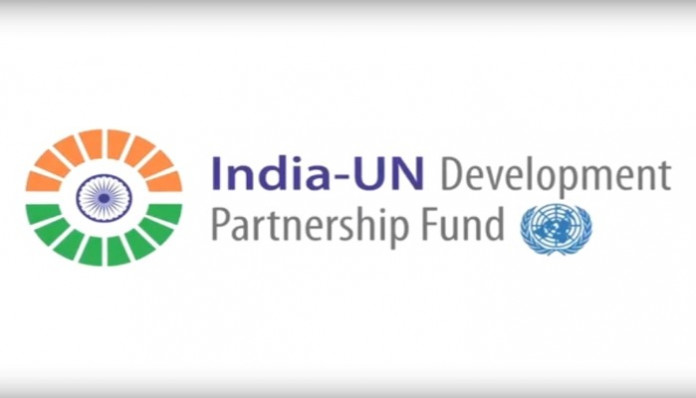When the Government of India launched the India-UN Development Partnership Fund in June 2017, it signalled its intent to provide support for projects in developing countries, particularly in the Global South, that aim to contribute to achieving Sustainable Development Goals (SDGs).
Over the past few years, the fund has allocated funds for projects ranging from poverty reduction and clearing land mines to climate disaster risk financing and maternal health services.
As of now, the Indian government has committed USD 150 million over the next decade for the Fund. This includes USD 50 million to support fellow Commonwealth developing countries, USD 14 million for the CARICOM group of countries, and USD 12 million for the Pacific Islands Developing States (PSIDS).
Here are some illustrative examples of how the India-UN Development Partnership Fund is trying to make a difference across the world.
FINANCIAL ASSISTANCE OF USD 1 MILLION TO NIGERIA
India will provide USD 1 million in financial assistance through the “Commonwealth Window” of the India-UN Development Partnership Fund at the request of the government of Nigeria. This funding will be allocated to the project titled ‘Biodiversity Business in Biosphere Reserves: A Means to Poverty Reduction, Biodiversity Conservation, and Sustainable Development’.
The main goals of this project are to acquire the instruments and equipment required for creating different biodiversity-based livelihood activities, carry out stakeholder discussions and stakeholder mapping, and perform socio-economic surveys.
It also intends to provide training on biodiversity conservation and environmental management, encourage the construction of specific biodiversity livelihoods, provide services for small company incubation, and promote the growth of business networks.
Speaking about this project, Permanent Representative of India to the UN, Ruchira Kamboj expressed India’s commitment to advancing the 2030 Agenda and the Sustainable Development Goals in the Global South through this funding support for Nigeria. She said, “India’s funding support for Nigeria for this project is reflective of India’s commitment to further advance the 2030 Agenda and the Sustainable Development Goals in the global south,” she was quoted as saying in a press release issued by the Permanent Mission of India to the UN in April.
The project will contribute to Sustainable Development Goals relating to zero hunger, quality education, decent work, economic growth, and life on land.
HELPING SENEGAL CLEAR UNEXPLODED MINES
In Senegal, India will extend a funding support of USD 771,931.54 from the India-UN Development Partnership Fund for a project known as the ‘National Mine Action Centre’.
According to information released by the Permanent Mission of India to the UN in New York, an area of 139,000 sq. mtr. in the Bignona and Oussouye districts in Senegal has unexploded mines that were laid during the internal armed conflict in the 1980s – early 2000s. The presence of mines in these highly cultivable districts adversely impacted socio-economic development and caused deaths and injuries to nearly 1,000 people.
“The funding assistance will be utilized to undertake technical surveys of locations, acquire advanced equipment, and accomplish demining activities. The demining exercise, once completed, will restore confidence among displaced communities to return, commence income-generating activities, and cause economic reconstruction of the region,” the mission said last month.
The project will contribute to Sustainable Development Goals relating to no poverty, zero hunger, good health, decent work, and economic growth.
FUNDING FOR FIJI’S PROJECT ON CLIMATE DISASTER RISK FINANCING
India will extend funding support of USD 700,000 from the India-UN Development Partnership Fund for the project ‘Scaling climate disaster risk financing framework and parametric insurance’.
The project seeks to extend parametric insurance digital solutions to households most vulnerable to climate catastrophe. The project expects 5,000 households and 200 MSMEs to register and benefit from the new parametric scheme.
The scheme will include heavy wind and heavy rainfall products as well as insurance products specifically for micro, small and medium-scale enterprises. It will develop financing solutions like digital savings and parametric micro-insurance products specifically for women and expand customer education campaigns.
“India’s funding support to Fiji for this project will assist local communities vulnerable to cyclone and related natural disasters,” Kamboj said.
The project will contribute to achieving Sustainable Development Goals (SDG 17 – strengthen the means of implementation and revitalize the global partnership for sustainable development).
BOOSTING MATERNAL HEALTH SERVICES IN KYRGYZ REPUBLIC
India will extend funding support of USD 1 million to the Kyrgyz Republic for a project to ‘Increase access of rural women to quality reproductive and maternal health services in maternity hospitals with the highest number of deliveries’.
The project aims to reduce maternal and neonatal mortality and morbidity through ensuring that quality tele-networking reproductive and maternal services are accessible and available in five maternity hospitals in the rural and mountainous regions of Jalal Abad, Karakol and Chui.
Two hospitals at the tertiary level in Bishkek, namely, the National Center of Maternal and Child Health and Osh inter-oblast Hospital will be equipped to provide supportive supervision through tele-networking to three maternity hospitals at the secondary level in the aforementioned regions.
The project will contribute to Sustainable Developments Goals relating to ‘good health’.
Additionally, India will extend a funding support of US$ 1,081,500 from the India-UN Development Partnership Fund to Moldova for the project, ‘Moving from a traditional to a register-based statistical system, resilient to humanitarian and emergency shocks’.
The project aims to address key challenges of data system in Moldova by shifting the focus from traditional data collection modalities to modern ones and conducting targeted longitudinal studies to better understand triggering factors of demographic changes in the country.
According to the Permanent Mission of India to the UN in New York, the Fund adheres to the principles of South-South cooperation and places a priority on national ownership and leadership, equality, sustainability, development of local capacity and mutual benefit.
The Fund particularly welcomes proposals from least-developed countries, landlocked-developing countries and small-island developing states and supports projects that are in alignment with the 2030 Agenda. The United Nations Office for South-South Cooperation is the designated Fund manager.




